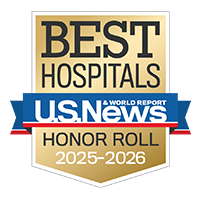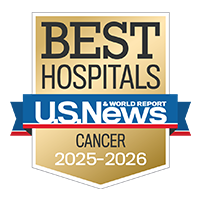Lynch Syndrome

Overview
Some families have multiple relatives who have colon cancer or other types of cancer. These cancers may be caused by a rare inherited genetic condition called Lynch syndrome, also known as hereditary nonpolyposis colorectal cancer (HNPCC). Lynch syndrome significantly increases your chance of developing colon cancer, and often earlier than the general population – before the age of 45. Nearly 3 percent of all colon cancers are caused by Lynch syndrome. It may also increase your risk of other cancers, such as endometrial and ovarian cancer in women.
The good news is that genetic screening and testing, available at major medical centers, detects Lynch syndrome in an estimated 95 percent of people.
By determining whether you and your family members have Lynch syndrome, you can take steps to seek appropriate medical care and surveillance, such as regular and consistent colonoscopies and check-ups at earlier ages. This can help to detect and prevent cancer, and ultimately, to save lives.
Our Approach to Lynch Syndrome
UCSF offers comprehensive genetic counseling for families with a history of cancer. Our goal is to help you manage your cancer risk. If you need to be screened for Lynch syndrome, our team can assess your personal and family history, and if appropriate, conduct genetic testing.
If you have the testing, genetic counselors and doctors will design a risk management program for you. It will include individualized recommendations for cancer screening, guidance on prevention and options for treatment. We will also counsel you on how to share this information with other family members who may be at risk.
Awards & recognition
-

Among the top hospitals in the nation
-

Best in California and No. 7 in the nation for cancer care
-

Designated comprehensive cancer center
Signs & symptoms
People with Lynch syndrome may have:
- Colon cancer that occurs at a young age, especially before age 45
- A family history of colon cancer that occurs at a young age
- A family history of endometrial cancer
- A family history of other related cancers, including ovarian cancer, kidney cancer, stomach cancer, small bowel cancer, liver cancer or other cancers
Those with Lynch syndrome have a 70 percent chance of developing colon cancer by age 70. Colon cancer patients with Lynch syndrome have an estimated 40 percent risk of developing a second primary colon cancer within seven years of being diagnosed after the first tumor. Women with Lynch syndrome have a 40 percent to 60 percent estimated lifetime risk of developing endometrial cancer.
Lynch syndrome may also increase a person's risk for cancers of the stomach, ovary, urinary tract, hepatobiliary tract, brain, small intestine, skin and pancreas.
Diagnosis
If you have a family history of cancer, it is extremely important that you let your doctor know. Your doctor will then take a thorough recording of your family history, paying particular attention to cancer diagnoses. If your doctor suspects that you may have Lynch syndrome, they will refer you to a health care professional who specializes in genetic cancer screening, testing and counseling.
In addition, all newly diagnosed colorectal cancer or endometrial cancer patients also should be screened or tested for Lynch syndrome.
Genetic Testing
Genetic testing involves a simple blood test. Your blood sample is sent to a special laboratory where it is analyzed for certain changes or mutations that indicate Lynch syndrome.
If you test positive for Lynch syndrome, meaning that genetic mutations were found in your blood, this does not necessarily mean that you will get cancer. It means that your lifetime risk of developing colon cancer is between 60 to 80 percent. You also have an increased chance of developing other cancers associated with Lynch syndrome.
A negative test result for Lynch syndrome, meaning that genetic mutations were not found in your blood, depends on additional factors such as whether your family members have Lynch syndrome or colon cancer. If you test negative for Lynch syndrome but have family members with the syndrome, your risk for colon cancer is not increased, but remains the same as the general population. However, in some cases, such as if you have a strong family history of colon cancer, a negative test result may still mean that you are at an increased risk for colon cancer.
Your genetic counselor will explain your test results and help you make decisions regarding cancer prevention, screening and treatment options.
Who Should Be Screened or Tested
Based on established medical criteria, the following people should be screened or tested for Lynch syndrome:
- Newly diagnosed colorectal or endometrial cancer patients The first step in Lynch syndrome diagnosis is evaluating your tumor for molecular features associated with Lynch syndrome. When a tumor is not available for screening, DNA blood testing can be done if your family history and cancer diagnosis strongly suggest Lynch syndrome. UCSF's Cancer Genetics and Prevention Program, in conjunction with our Gastrointestinal Cancer Prevention Program, offers a unique service to all colorectal cancer and endometrial cancer patients. We automatically screen patients' tumors for Lynch syndrome at the time of their surgery for colorectal or endometrial cancer. Patients who screen positive are then referred for genetic counseling and testing.
- Patients diagnosed with more than one Lynch syndrome-related cancers If you have been diagnosed with multiple cancers associated with Lynch syndrome including colorectal, endometrial, ovarian, gastric, small bowel, upper urinary tract, hepatobiliary tract, pancreas, brain and sebaceous neoplasia of the skin, you should be screened or tested for Lynch syndrome.
- Patients with a family history of colorectal or endometrial cancer If you have two or more relatives with colorectal or endometrial cancer, particularly if one was affected before age 50, you should be screened or tested for Lynch syndrome.
Treatments
Based on your family history, genetic testing results and other cancer risk factors, your counselors and doctors will provide you with an individualized risk management program that includes recommendations for cancer screening, prevention and treatment options.
Cancer Screening for People with Lynch Syndrome
If you tested positive for Lynch syndrome, but do not have a cancer diagnosis, or your doctor suspects that you have Lynch syndrome, the following cancer screening plan may be recommended.
Colorectal Cancer Screening
Colonoscopy every one to two years, starting at the age of 20 to 25 years (age 30 years in families with a certain mutation known as MSH6) or 10 years younger than the youngest age at diagnosis in the family, whichever comes first.
Endometrial Cancer Screening
While there is no established screening for endometrial cancer at this time, given the high risk of developing the disease in women with Lynch syndrome, the following may be recommended:
- Endometrial biopsy every year beginning at age 30 to 35. An endometrial biopsy is necessary in women with Lynch syndrome who report abnormal symptoms such as irregular vaginal bleeding or post-menopausal bleeding.
- Transvaginal ultrasound for endometrial and ovarian cancer every year beginning at age 30 to 35.
- Urinalysis with cytology every one to two years beginning at age 25 to 35.
- Detailed medical history and examination, education and counseling regarding Lynch syndrome every year beginning at age 21.
Treatment for Cancer Patients with Lynch Syndrome
Surgery may be recommended to patients with colorectal cancer who test positive for Lynch syndrome in order to prevent additional cancer. For instance, if you have colorectal cancer and test positive for Lynch syndrome, it may be recommended to remove the majority of your colon at the time of your surgery for colon cancer, which would reduce your risk of developing another primary colorectal cancer tumor from 40 percent to 1 percent. Likewise, female patients with colorectal cancer may also want to consider having their uterus and ovaries removed to prevent the occurrence of endometrial and ovarian cancer associated with Lynch syndrome.
Your counselors and doctors can help you decide which treatment option is the best for you.
UCSF Health medical specialists have reviewed this information. It is for educational purposes only and is not intended to replace the advice of your doctor or other health care provider. We encourage you to discuss any questions or concerns you may have with your provider.
Recommended reading
Where to get care (5)
Related clinics (4)

Osher Center for Integrative Health
 2
2






















